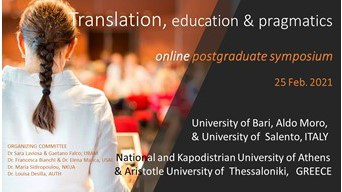Description
Micro-narratives in film trailer translation
Blana Maria Nikoleta
MA_NKUA & 67th/69th/44th Primary Schools of Athens
Meaning transfer practice may entail the adaptation of an original source product into multiple target versions which may, in their turn, be modulated in order to fit into different language and/or media forms (Whited 2002). Each of these adaptations informs the “textual system” of the source product (Shavit 1981: 68-9; 1986: 111-15), whose components converge in depicting the main plot and characters, but may as well diverge in several other ways which are equally accountable for the creation of distinct narrative patterns. Even though language may be considered as the prime suspect for this differentiation, the manipulation of various media channels may, in fact, be of decisive importance in this narrative-creation process (Diaz-Cintas 2009 4-5; Gambier and Henrik 2001: viii). Film trailers serve as micro-narrations of source products, a ‘targeted synthesis’ whose purpose is to promote the film to its audience (Dusi 2014). The study examines cinematic and televisional trailers specifically designed to advertise two temporally distinct films of the Harry Potter Saga, i.e. Harry Potter and the Philosopher’s Stone (2001), Harry Potter and the Deathly Hallows Part 2 (2011), to Greek viewers. The assumption is that there are separate diegetic patterns based on their trans-media differences (the broadcasting medium of these trailers, cinema/television) and the temporal distance between trailer release. On the one hand, trailer transfer seems to display variation owing to the gradual immersion of the target audience into the fantasy world of Harry Potter, on the other, trailer translations commissioned for television are more in line with the target movie narrative than those commissioned for cinema distribution, presumably because they address a different set of audiences—cinema goers as opposed to a more generic viewing public. The study highlights the importance of pragmatic parameters in shaping the discourse of translated products.

